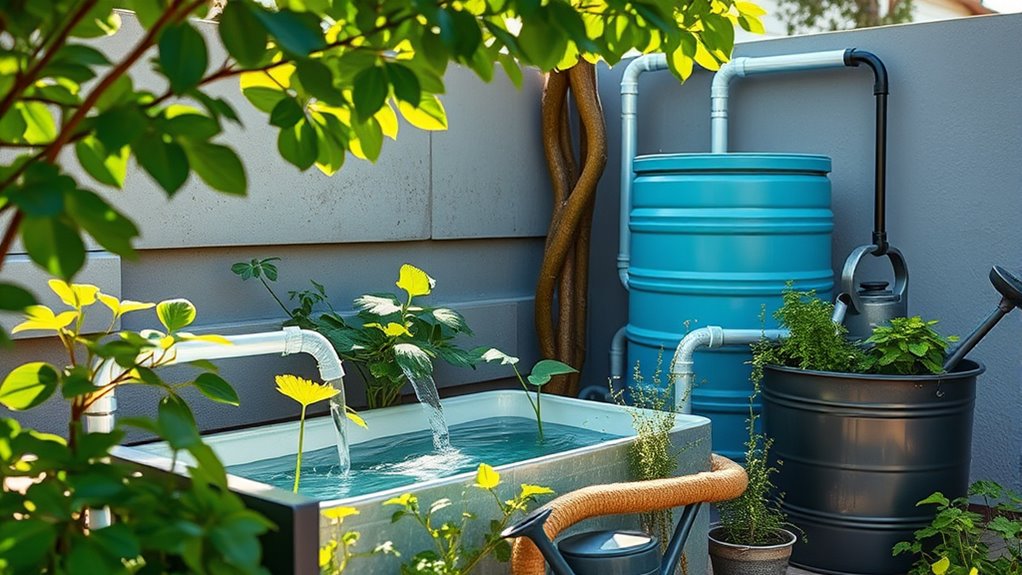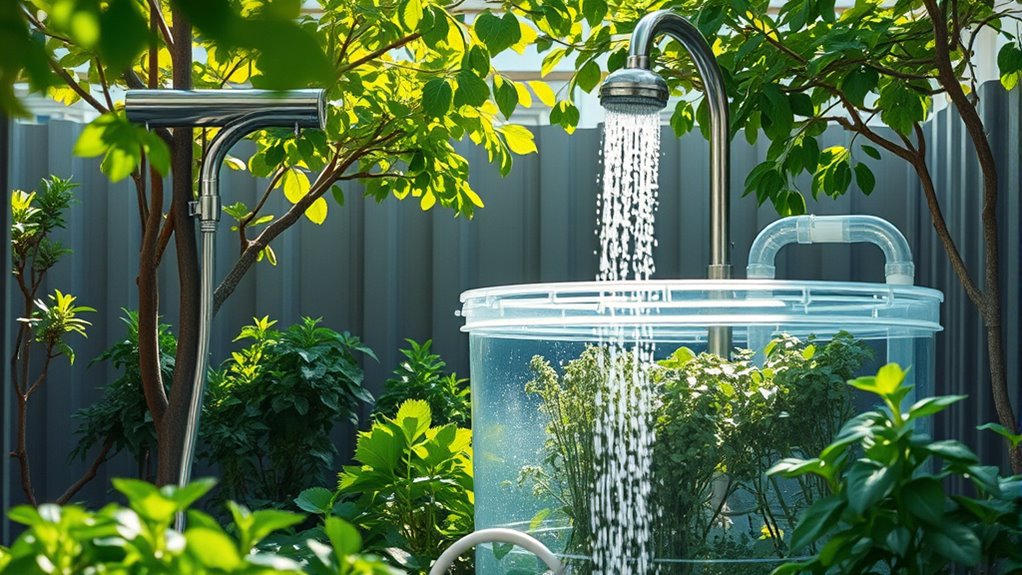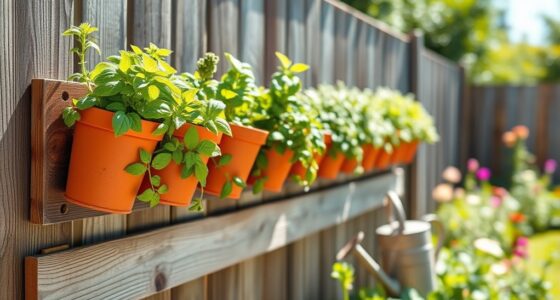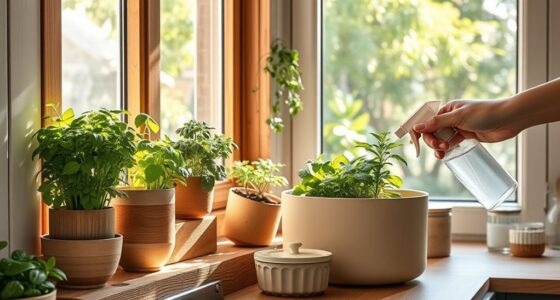To make everyday water use more eco-friendly, start by recycling greywater from sinks, showers, or laundry for non-potable needs like garden irrigation or toilet flushing. Install simple diverters or filters to safely redirect water without complex plumbing changes. Use treated greywater to nourish your plants while reducing water bills and environmental impact. By adopting these practical tips, you’ll contribute to resource conservation—discover more ways to implement sustainable plumbing practices as you explore further.
Key Takeaways
- Install simple diverters or filters to redirect greywater from sinks and showers for garden or toilet use.
- Use biological or chemical treatment systems to ensure greywater is safe for non-potable applications.
- Incorporate greywater recycling into your plumbing to reduce freshwater consumption and lower utility bills.
- Use nutrient-rich greywater for irrigating plants, promoting healthy growth and eco-friendly gardening.
- Regularly maintain and clean greywater systems to prevent clogging, bacteria buildup, and ensure consistent performance.

Have you ever considered how much water goes to waste every day from sinks, showers, and laundry? The truth is, a significant portion of household water can be reused if you adopt simple, eco-friendly practices. Greywater recycling offers an effective way to conserve water and reduce your environmental impact. By implementing greywater treatment systems, you can divert water from your sink, shower, or washing machine for reuse in your garden or toilet flushing. This approach not only lessens your reliance on municipal water supplies but also supports sustainable plumbing practices that prioritize resource efficiency.
Reusing household greywater helps conserve water and supports eco-friendly, sustainable plumbing practices.
When you set up a greywater system, you’re taking a step toward more sustainable plumbing. These systems typically involve collecting wastewater that isn’t contaminated with sewage, filtering or treating it to remove solids and pathogens, and then redirecting it to your landscape or other non-potable uses. You don’t need to overhaul your entire plumbing—simple diverters or filters can be installed to manage greywater safely. This way, you’re reducing the volume of fresh water used for outdoor watering or flushing toilets, which accounts for a large chunk of household water consumption.
The process of greywater treatment can vary depending on your setup and needs. Basic systems might include a diverter that channels water from your shower drain into a storage tank, where it’s filtered to prevent clogging and the spread of bacteria. More advanced systems use biological or chemical treatments to ensure the water is safe for reuse. By choosing a system suited to your household, you can ensure the greywater is appropriately treated, preventing any health or environmental issues. Proper greywater treatment keeps your garden healthy and minimizes the risk of contamination or odor. Incorporating appropriate treatment methods can further enhance safety and efficiency.
Adopting sustainable plumbing solutions through greywater recycling doesn’t mean sacrificing convenience. Many systems are designed to be low-maintenance and integrated seamlessly into your home’s existing plumbing. Plus, using greywater for irrigation means your plants benefit from nutrient-rich water, which can promote healthier growth. You can also use treated greywater for flushing toilets, further reducing your freshwater consumption. This dual benefit of conserving water and supporting plant health makes greywater recycling a smart, eco-friendly choice.
Incorporating greywater treatment into your daily routine empowers you to live more sustainably. It’s a practical way to reduce your environmental footprint while saving money on water bills. As awareness about water conservation grows, more homes are turning to sustainable plumbing solutions that make greywater recycling accessible and effective. By taking these steps, you’re not only protecting precious water resources but also contributing to a healthier planet for future generations.
Frequently Asked Questions
Is Greywater Recycling Legal in All Regions?
You might wonder if greywater recycling is legal everywhere. The answer is no; regional restrictions and legal considerations vary widely. Some areas have strict regulations or require permits, while others encourage eco-friendly practices. Before you start, check your local laws to guarantee compliance. Understanding these rules helps you safely and legally recycle greywater, making your eco-conscious efforts effective and worry-free.
What Are the Long-Term Cost Benefits of Greywater Systems?
You’ll notice long-term cost benefits from greywater systems through significant cost savings on your water bills. By reusing water for irrigation and other non-potable needs, you reduce your reliance on municipal water. Plus, you lessen your environmental impact, conserving resources and lowering your carbon footprint. Over time, these savings and eco-friendly practices make greywater recycling a smart investment for both your wallet and the planet.
Can Greywater Be Safely Used for Drinking?
You can’t safely drink greywater because of health risks. Greywater may contain bacteria, chemicals, and pathogens that pose health hazards. Proper water treatment is essential before any reuse, but greywater treatment systems aren’t designed to make water safe for drinking. To protect your health, always use potable water sources for drinking and guarantee greywater is only used for non-potable purposes like irrigation after proper treatment.
How Do Greywater Systems Impact Home Plumbing Maintenance?
Imagine your home’s plumbing as a delicate garden; greywater systems add new pathways that can enhance or hinder maintenance. You need regular plumbing inspections to catch system malfunctions early, preventing costly repairs. Properly installed and maintained, greywater systems seamlessly integrate, but neglect can lead to leaks or clogs. Stay vigilant, keep up with inspections, and guarantee your system operates smoothly without disrupting your home’s plumbing harmony.
Are There Environmentally Friendly Alternatives to Greywater Recycling?
You might wonder if there are environmentally friendly alternatives to greywater recycling. Natural filtration methods, like composting toilets or rain gardens, offer organic alternatives that reduce water use and pollution. These options utilize natural processes to treat waste and stormwater, making them eco-friendly choices. By embracing these natural solutions, you can cut down on water consumption and support sustainable practices without relying solely on greywater systems.
Conclusion
So, next time you toss that soapy water down the drain, remember—you’re basically flushing away potential plant food and saving the planet one sudsy splash at a time. With greywater recycling, you’re turning your bathroom into a mini eco-warrior’s haven, practically making your home a lush jungle while saving precious resources. Who knew that a simple rinse could transform your house into a verdant paradise? Go ahead, get your hands wet—literally—for a greener, more sarcastic tomorrow.









